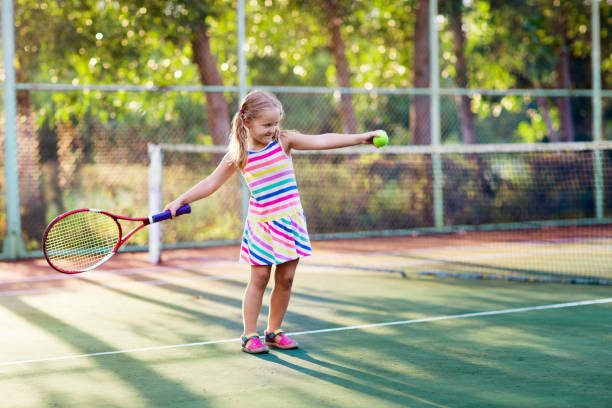Why involving Kids in Sports at a Young Age is Important?
5 minuteRead

Any after-school activity might require a significant time commitment from parents. Sports for kids are no different. To get the kids to practice sessions and matches, parents frequently find themselves constantly juggling their schedules. Even while some people might perceive children's sports to be overly competitive and intense, most families are aware of the many advantages of having their children participate in sports. They are therefore open to making any adjustments required.
In fact, recent research discovered that 76% of parents support their children playing sports in middle and high school. The parents are aware of the benefits of physical activity for their children's health. But that's not the only reason they support the kids' participation in organized sports.
Sports teach children how to win and lose. They gain experience with working hard, giving it their all, and still losing. Likewise, they come to understand what it's like to work hard and succeed. You can’t teach these lessons to your children. They have to experience it.
The skills that children learn from sports, teach them so much that helps them in their life ahead. Let’s discuss this in brief.
1. Helps build Self-esteem
A child that plays sports will create goals for themselves and feel fulfilled and accomplished when they reach those goals. When kids do well, they will also enjoy successes, reach new personal highs, and win accolades from their coaches, teammates, and you as a parent. All of these instances encourage self-assurance in your child and demonstrate to them that they can achieve anything they set their mind on. As they set goals in their career or in their personal lives as adults, this confidence remains constant in them.

2. They learn Leadership
Sporting activities offer children the chance to take leadership roles. Through sports, kids learn rapid thinking, delegation, and courteous engagement with their peers, coaches, and officials. This can be done in a variety of ways, such as serving as a team captain or simply taking the initiative to resolve differences in the team.
3. Develops a Sense of Responsibility in them
Kids who play sports learn the value of responsibility. They will observe how skipping a session or putting in little effort affects their personal results and perhaps even the performance of their team. Your kid will discover how slacking off on their homework and studies may eventually have an impact on more than just themselves if their ability to participate in sports is based on their academic performance if that is the case.
Your child will also learn to take responsibility for the things related to playing their sport, such as keeping their uniforms clean and their equipment in excellent condition. All of these behavioral patterns continue to follow them in their professional life ahead which will lead them to do well and make decent income.
4. They will stick to Healthy Habits
Children who participate in sports are aware of how adequate diet, rest, and other healthy behaviors affect their athletic performance. A child develops an appreciation for practicing good health when they discover at a young age that there is a direct link between how they treat their bodies and how they feel and perform. Even if your child isn't as active as they were when they were younger, these behaviors can be maintained into adulthood. People who participated in sports as youngsters may also be less prone to consume drugs or alcohol as adults since they didn't want to jeopardize their athletic ability by abusing dangerous substances when they were younger.
Children will grow up with stronger bones and muscles, as well as less body fat and higher cardiovascular fitness, according to studies. Children who participate in sports develop lifelong healthy behaviors.
Another advantage is improved mental wellness. Children who participate in sports have less stress, gain better life skills, and excel academically. Physical activity encourages the release of brain chemicals called neurotransmitters that help with both mental and emotional health.
Serotonin and endorphins are released during exercise. Additionally, it lowers adrenaline, enabling children to express their emotions.
5. They Adapt Social Skills
Your child will meet a broad range of personality types through sports that they might not have otherwise encountered. These abilities are especially crucial in today's culture, as technology has a more negative impact on screen time and even hinders face-to-face contact. Children that participate in sports will learn how to get along with different people and adjust to their ways in order to solve problems, accomplish objectives, and communicate effectively.
6. They Master Teamwork
Your child will require cooperation throughout their entire lifetime. Your child will require to compromise, delegate, and accept criticism from others when they join extracurricular activities like academic clubs or volunteer work when they become employed and even when they get married. A child who has previously participated in sports will have acquired useful skills through teamwork to accomplish a common objective and through learning how to help others while pursuing their own personal ambitions.

Key Takeaway
It's likely that if your child plays sports, they won't always be the best player on their team or even on the field, nor will they win every match. Your kid will acquire a positive attitude toward competition by dealing with loss and being exposed to high-level sportsmen who might be better than them. Encourage your child to regard talented athletes who compete on a par with them as examples of where they can grow and how they can become better athletes themselves, and use their losses as an incentive to get better. This lesson they will need for life because we all know that life isn’t always fair. And we gotta be happy despite this fact because we got only one life! We cannot spend it being sad or regretful.
Write, Record and Answer! Consume Unlimited Content! All you need to do is sign in and its absolutely free!
Continue with one click!!By signing up, you agree to our Terms and Conditions and Privacy Policy.














